A year on from hiring our first six International Fellows
A year ago, Charlie Goldsmith Associates advertised for people to join its ‘Fellowship scheme’, for talented fresh or recent graduates: http://charliegoldsmithassociates.co.uk/blog-leopardsnotfatcats/.
This responded to DFID’s focus on youth in development, and the 2015 DFID Youth Summit. As a for-profit company, our reasoning was that better talent development was better business.
We said “if you think you’ve got all the impressive stuff that it takes for the Civil Service Fast Stream, Teach First, a big regiment, consultancy, or the big graduate schemes, but your vision is international, medium term, focused on the poorest of the poor, then we would like to hear from you”.
We specifically targeted hiring from the North of England, and AidWorks, a social enterprise based in Sheffield, helped us get the word out across the North.
We had about fifty applicants, almost all of them very well suited: there was clearly an enthusiasm for these roles out there – which was all the more impressive since the pay was UK minimum wage!
This blog is about the International Fellows programme – another one follows soon about how South Sudanese colleagues have been moving on up.
Meet the Fellows
“We are Anna, Alec, Ellie, Juliet, Emily and Kristine!
Kristine is from Denmark. She’s a qualified nurse with a MSc in International Health who has been working in Africa since she was 20, including several years of nursing in Uganda, living very simply.
Anna is from Newcastle, and had just finished her MSc in Violence, Conflict and Development at SOAS last year. Alec is from Sunderland, and had just finished his MA in Politics at the University of Leeds. Juliet had just finished her BA in Politics, Philosophy and Economics at Oxford. Between degrees Anna had worked in community development projects in Northern Ireland, India and Namibia.
Ellie graduated from Cambridge in 2011 with a degree in English, and had worked in local government and PR, and sang at St Alfege, Greenwich – our company’s home parish. Emily graduated with a BSc in Politics and International relations from Bath and worked for a small NGO and then a development consultancy.
We all joined the team in October 2015. We did a week’s induction in London, where, as well as normal management consultancy PowerPoint and spreadsheet boot camp and a briefing on PFM principles, the boss explained to us that a rifle sounds like “pop pop pop”, and a mortar sounds like “whoomph”: this turned out to be more useful than we expected!”
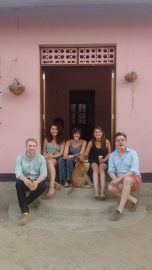
What the Fellows have been working on in South Sudan: Girls’ Education South Sudan; education sector Human Resources Information System
The Fellows have been busy on a number of tasks for Girls’ Education South Sudan, DFID’s flagship project in South Sudan https://devtracker.dfid.gov.uk/projects/GB-1-202511, for which our company leads on national school enrolment and attendance reporting, a programme of school grants (to more than 3000 schools) and cash transfers (that have reached more than 120,000 individual girls and their families) – all of which you can watch in real time on www.sssams.org – and on knowledge, evidence and research, as part of a consortium led by BMB Mott MacDonald.
In the autumn, Juliet, Alec, and Anna travelled across much of the Greater Bahr-el-Ghazal region to monitor payment of the cash transfers, dealing with schools cut off due to flooding, fuel shortages making it difficult to keep vehicles moving, and operating well beyond the coverage of mobile phone networks. Juliet says: “Seeing the reaction of the girls receiving the money has shown us all first-hand the worth of the work that CGA is doing in South Sudan.”.
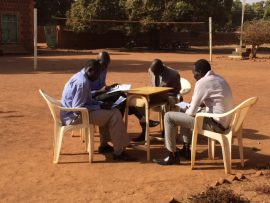
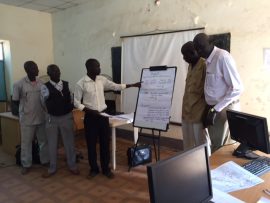
Since spring, four of the Fellows have been leading delivery of a programme of studies of twenty schools that GESS is following in detail, spending days following the teachers and girls to build evidence about what works for school development and to keep girls enrolled, attending and achieving in school.
Meanwhile, Alec and Kristine have spent months and months in the bush delivering an HR Information System for South Sudan’s education sector – see www.hrisrss.org – that provides comprehensive assurance of who is delivering education servies – photos, biometrics, scans of documents – and a necessary cross-check to the GRSS payroll. This has been funded by the EU Delegation to South Sudan.
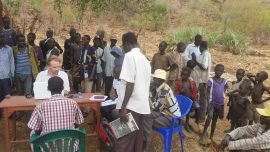
Concord: Music and Community
Charlie had said that international development work requires “knowledge of, and some degree of integration in and affection for, the community in which you work”: potential Fellows were asked what they could bring, particularly in the areas of sports and music, which are areas that offer a ready opportunity to share interest and achievement.
The Fellows have all been involved with CGA’s longstanding corporate social responsibility partner, Confident Children out of Conflict (CCC), who look after orphaned and vulnerable children, many of whom have had an exceptionally rough start in life, essentially below the floor of the poorest country in the world.
With supervision from Joe Timmons, one of the company’s senior South Sudan staff, three of the Fellows have sung with the girls’ Choir of CCC, who provide choral music at All Saints’ Cathedral, Juba. Juliet continues: “The girls at CCC bring so much energy and enthusiasm to choir practices that it makes running the choir an absolute delight. The continuity provided by the Fellows has also allowed some real momentum to build behind the choir. Cassocks have been made for each girl, and they look smart and feel proud in them”.
The choir sings every Sunday, and for special occasions: at Christmas, they delivered a Kings’ College-style Nine Lessons and Carols to a packed All Saints’ Cathedral. At Easter, they sang for all the major services, and they have begun to offer a monthly Choral Evensong too.
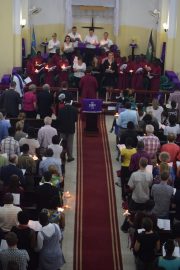
For the Fellows and the girls, working together in the choir is a way people from very different backgrounds can achieve great things together as equals.
Some people might argue that quality choral music isn’t a priority in a Fragile and Conflict Affected State; Charlie doesn’t agree at all. He recalls something the musicologist Paul Spicer wrote in his biography of Herbert Howells: “[Howells’ style in church music came with] a real desire to enrich people’s lives by adding a degree of contemporary beauty in the music they are hearing which has been hitherto almost unknown. It is exactly the same principle as the building of Oxford Movement (high church) churches in the very poorest areas of towns and cities in the Victorian period. The introduction into ordinary people’s deprived lives of something of order, colour and remark to which they could not only relate, but feel was also feeding them spiritually, and which also attempted to make sense of their …existences, had to be an influence for good.”
And here is another version, from DFID Permanent Secretary Mark Lowcock, in a speech at Warwick University last year: “Amartya Sen takes the view that development is about the accumulation and spread of freedoms – not just from material poverty and hunger, but from violence, insecurity, injustice and the repression of free speech and personal choices. That is clearly right: a good and decent life for anyone involves a lot more than food, shelter, clothes and the other basics to ensure survival.”
This is not to say that there aren’t serious questions to be asked about opportunity costs of what you do in Africa; but it does mean that we think there is a place in development for more than providing for survival.
Conflict comes back to South Sudan – Fellows keep going
In July 2016, conflict erupted again in South Sudan. The Fellows were spread out across the country with their South Sudanese colleagues carrying out research visits. Their response was to keep calm and carry on with the GESS midline studies, which will be published in September. For the next few weeks their work will be carried out around the country, using Lokichoggio on the South Sudan/Kenya border as their base of operations. Meanwhile, Joe will keep things moving in the Cathedral: expect lots of plainchant for the next few weeks!
CGA’s strong embedding in the South Sudanese community – and the justified confidence the Fellows can have in being able to operate in such a formidable environment – means that we, and the Fellows in particular, can keep going at a time when other international development actors find it more difficult to.
What next for the Fellows: Carry on up the Nile!
Juliet is going back to SOAS to do a Masters’ – but with a view to coming back to the firm. Everyone else plans to stay together, and carry on delivering, in South Sudan and in other countries where the company works: Charlie and the CGA team feel they now have a cadre of development professionals with experience and training that money cannot buy. We are also working with Aidworks on a plan to try and have this year’s benefits feed back into Northern Universities and Schools.
We are not so big a company that we can afford to run a recruitment round like this every year: we hope our next Fellows round will be in summer 2017 – if you would like to be kept updated, do email fellows@charliegoldsmithassociates.co.uk.
North and South: identifying talents, and moving them around, as a way of building community
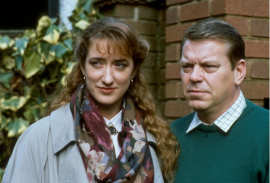
Whether you were a Brexiter or a Remainer (and the Fellows include both), the UK’s EU Referendum result exposed to everyone the point that our plan to Get the North to the South touched upon: that large parts of the UK are missing out on the opportunities that London and the South benefit from, meaning talent from the rest of the country gets overlooked, and potential connections missed.
The UK is fortunate that its democracy provided a way in which areas that had not shared in national growth and prosperity could remind their compatriots that they have, as King Lear said, “taken too little care of this”.
We think programmes like our Fellowship programme (and others like ICS or the ODI Fellowship or the OPM Legal Fellowships, and, further along the road, the Tony Blair Africa Governance Initiative) can have a catalytic effect in helping to keep England and the UK’s communities outward-focused, and to building development in the UK and the world that works for everyone[1].
Not only because the impact at work of determined young people, when their talent is called out and developed, is considerable, but also because of the way in which the new global links they are making are shared by the communities they come from: not only is Alec, our Sunderland Black Cat, now an Agile African Leopard, and not only do South Sudanese girls now sing repertoire from Palestrina to Sister Act with confidence and enjoyment, but Alec’s hockey club back home is busy raising funds for CCC and people from all over the world watched the girls sing “God Save the Queen” and “South Sudan Oyee” for the Queen’s Birthday Party.
And the perils of the alternatives to building bonds of interest, affection and development are plain to see in the sad events of economic downturn, tribalism and terror that domestic and international news at the macro-scale have brought over the last month.
[1] (Charlie also has a cunning plan for how a scheme like this could be systematically good for the Church of England and the Anglican Communion…).

